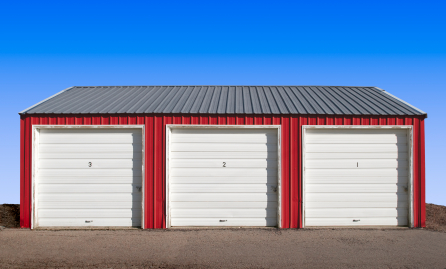Lock-up your clutter! Self storage in lock-up garages

The world’s most famous lock-up
You want to be careful with an 18th-century pocket watch made by John Harrison; a lock-up garage is probably not the best place to store it. But this is what “Del Boy” Trotter keeps in the world’s most famous lock-up, in the popular BBC sitcom Only Fools and Horses ‒ until it is discovered by chance by an antiques dealer and sold at auction for £6.2 million.
Lock-up garages ‒ sometimes known as “lugs” in the trade ‒ form part of the spectrum of self storage. They are, simply, purpose-built garages, for cars, often constructed in rows or blocks, fronted by their up-and-over or roll-up doors. At their most basic level, they may be just single rental units, leased privately from the owner.
“Lugs” can be the cheapest kind of self storage available. Prices vary across the country. A lock-up garage in Central London may set you back between £325 and £500 a month, but £175 a month in the suburbs, and only £60 a month ‒ or even as little as £30 a month ‒ elsewhere.
The average lock-up garage measures about 124 sq ft (16ft 5in by 7ft 5in). Renting an equivalent space in a conventional self storage warehouse would cost about £250 a month.
Price, however, may well reflect security ‒ or the lack of. Lock-up garages may be only as secure as the padlock you put on the door.
Leaving money to rot
Because they are often unmonitored and unregulated, lock-ups have acquired a dodgy reputation: the fairytale find in Only Fools and Horses glosses over a more brutal reality. Locks-ups have been used to hide illegal drugs, terrorist weapons and the corpses of murder victims; they have been converted into forgery workshops, and used as drive-in brothels.
In March 2010, a trial at Southwark Crown Court convicted a gang of drug smugglers who had used a number of lock-ups in and around South London to store colossal quantities of “skunk” cannabis. But what really caught the attention of the press was the £60,000 in bundles of £20, which ‒ such was their wealth ‒ the gang had neglected and allowed to rot irreparably in the damp conditions.
In defence of lock-ups
Such incidents give lock-ups a bad name, of course. But it is wrong to tar all lock-ups with the same brush. They may provide just the kind of space you need, for a good price, and in just the right place (with 24-hour access).
Many lock-ups are perfectly safe and well managed; owners may demand rigorous proofs of identity from clients, and their lock-ups may be protected by trigger lights, security cameras, or even enclosed within a secure compound. Some of the warehouse complexes of the larger self storage companies contain ground-level lock-ups, which can be used for garaging or for storing heavy or bulky items.
Some companies have created a thriving business out of lock-ups. Rodger Dudding was listed as the 600th richest man in Britain in 2009, having made his fortune largely from buying up and managing lock-ups. His company, Dudrich Holdings, now operates some 12,000 “lugs” in London and the south.
Lessons from crime
The rotting £20 notes are a salutary reminder: lock-ups are often damp. Users are advised to store their possessions off the floor on pallets, and away from the walls. Vulnerable items should also be sealed in polythene. Lock-ups may also become very hot in summer ‒ not the place to store fine wine, ill-gotten or otherwise.
And remember to insure your possessions against damage ‒ and crime.
2 Responses to “Lock-up your clutter! Self storage in lock-up garages”
Leave a Reply
Subscribe to This Blog
Get new blog posts sent to you by subscribing to RSS updates or to email updates.







Please can you send me some informations on Lock Up Garages in the London N4 area please.
Thanks.
George.
Yes, enter a postcode in our ‘Get a Quote’ form to be sent quotes from up to four storage companies in the area.
best wishes,
David